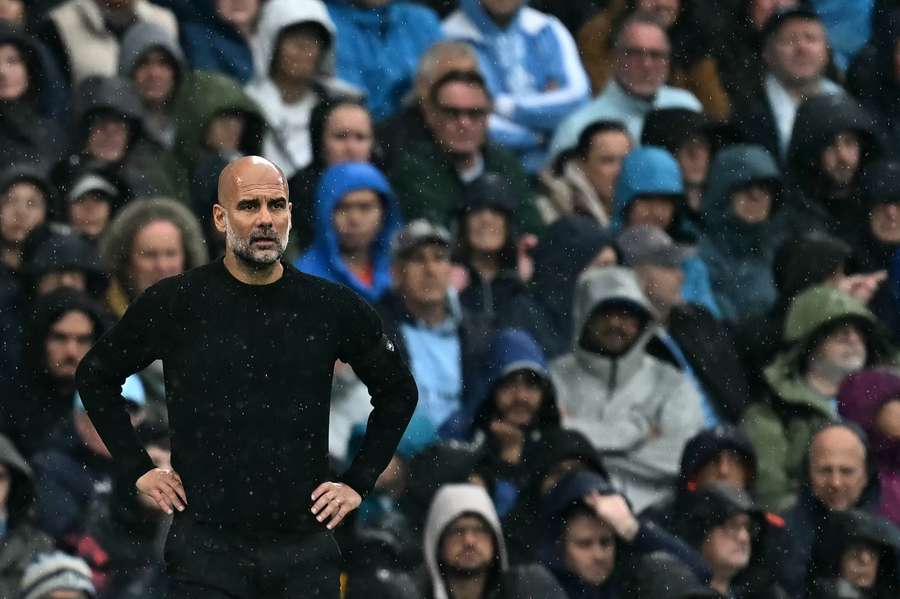How Guardiola and Man City went British best to thwart Arsenal

The contract is running down, but on yesterday's evidence, it's difficult to see Guardiola leaving Manchester City at the end of this season. His chair copped a kicking. The fourth official a barrage of verbals. And in the aftermath of this thrilling 2-2 draw, City's manager offered every indication that he's up for this fresh challenge thrown down by Mikel Arteta and Arsenal.
"Many, many things happened, they delayed the game, we behaved really well and still have this passion inside to fight the contender to steal our Premier League," Guardiola would say afterwards. "Still we are there..."
In other words, you're not going to knock us off. Not Arsenal. Not anyone. It took 98 minutes for John Stones to scramble home that equaliser. But as Guardiola would remark, they still found a way to deny Arsenal their win.
It was a new way. An aerial way, as Stones would later admit. Quizzed what Guardiola's instructions were as he entered the pitch with 20-odd minutes to run, Stones was brutally frank: "He wanted me to play closer to Erling (Haaland), get higher up the pitch so when we got crosses in we could start to win more aerial duels."
High balls? Long balls? From Pep? Win the nod-down. Try to force an equaliser, one way or another. The ghosts of tiki-taka have long disappeared. It was brute force from Pep and City in those final minutes. And it worked...
Again, is Pep really going to leave all this? The Premier League. It's in his veins. Under his skin. As we've stated in past columns, Guardiola arrived at City eight years ago with the expectation of transforming English football. But it's the Premier League that's changed him.
A big, aggressive centre-forward up top. Two tricky wingers hugging each touchline. City don't do tiki-taka. The false nine of Pep has long gone. It was virtually 4-2-4 on Sunday. The stuff of Shankly, Ferguson Brian Clough. Even the combinations in midfield between Ilkay Gundogan and Mateo Kovacic could easily have been seen 40 years ago on the pitch at Anfield.
Of course, he hasn't gone full British best. But Pep's Barça teams were never set up like this. And they certainly, with Erling Haaland, Savinho and Jeremy Doku, never had these types of personnel options.
And when it came to the crunch. When that equaliser needed to be found. It was still pass-and-move, pass-and-move. But with a big centre-half up front alongside the centre-forward, there was the added option of a high ball. In the end, for City and Pep, it was more Bassett than Bielsa.
Indeed, for all the quality and flair between the two teams, their final two goals were owed to physical strength. Gabriel Magalhaes fooling Kyle Walker with a silly game of pattycake to get himself on the end of Bukayo Saka's corner to head Arsenal into the lead. Gabriel was unstoppable in that moment - though Saka also deserves greater recognition for the quality of his set-piece. It was virtually unstoppable for Ederson and City's defenders.
And then came Stones' moment. A hit and hope drive. Josko Gvardiol getting his body between the ball and David Raya, with Stones the quickest to react. The type of goal you'll see up and down the football pyramid every weekend. Pep and his City players found a way...
But there is a qualifier. Post-match, City's players didn't react as expected. There were complaints. Digs. Arsenal were "time-wasters". They employed the "dark arts". Bernardo Silva. Walker. Stones. They all had their pop. Instead of simply accepting Arsenal's approach - particularly with ten men. City's players complained. Whinged. And in doing so, there's a danger of talking their way into a future defeat.
Guardiola spoke better in the aftermath. Yes, Arsenal's plan was to "block" and frustrate. But it was something to overcome. Not to use as an excuse - which City's players were bordering on doing when speaking to the press.
Guardiola would later highlight how they managed to combat the 'go-slow' tactics: "The most important thing in that position was when Raya had the ball and Havertz challenged, we didn't make fouls.
"Fouls would have taken one minute and been a long ball. We were so smart and brilliant to interpret these things. That's a question of talent.
"Raya made two or three saves that the second ball was not with us and then John was there. It's chaos and a little bit lucky. It's difficult.
"Congratulations to Arsenal for being so strong mentally to block for a long, long time. That's not easy but we were patient."
Indeed, as Guardiola says, there's a correct - even sophisticated - way of overcoming timewasting. Something City successfully employed on Sunday. Another innovation from a manager who continues to surprise. Does Pep really look like he's ready to walk...?

